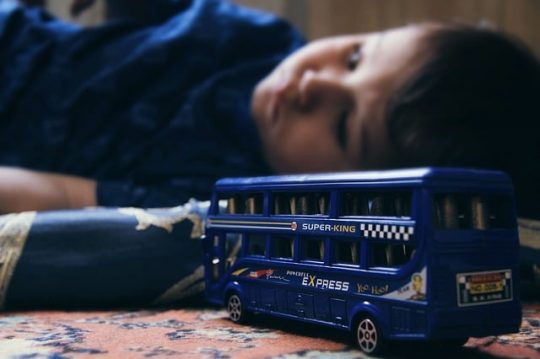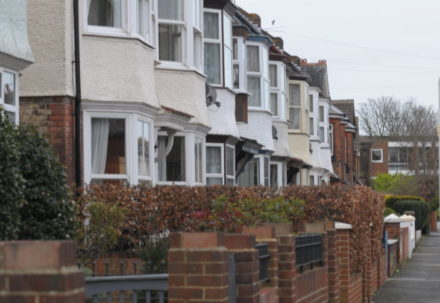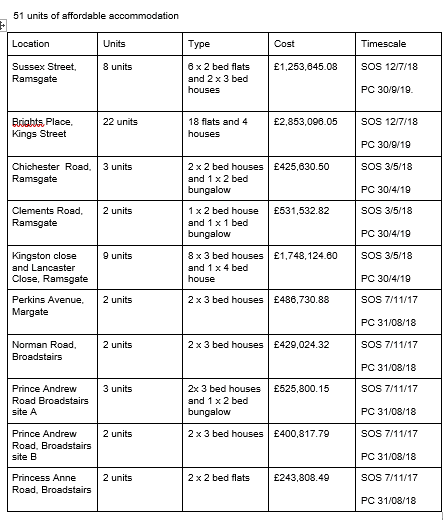
Caps on benefits, a lack of affordable homes and rising private rents are creating a housing crisis in Thanet.
The number of households placed in temporary accommodation has spiralled from 44 at the end of March 2015 to 147 by March 31, 2017.
And the use of emergency bed and breakfast has almost tripled in the past two years – as have the costs.
In March 2015, there were 24 households in emergency B&B. By March 2017 this figure was 63, with 18 of those including children or pregnant women.
The accommodation is paid for on a night by night basis, and it is a heavy drain on council resources. In 2015/16 Thanet council paid out £390,259, by 2016/27 this had risen to a whopping £1,103,225.
‘Getting harder’
Thanet council head of housing Bob Porter (below) says the problem has worsened and is becoming more difficult to deal with.

He said: “The situation is difficult and getting harder for people, particularly people on low incomes or welfare benefits.
“Before we relied on supporting people into private renting but rents are growing and there is the need for guarantors, we can make discretionary housing payments but it is becoming much more difficult.
“There are restrictions on benefits and housing allowances and this makes it much harder for us to do homelessness prevention work to stop people getting to crisis point.

“Bed and breakfast is a last resort. It is not good for families and children and it is expensive, but sometimes there is no other choice.”
Temporary homes
One change to emergency accommodation has been the use of a Kent landlord who provides homes on the same nightly payment basis as B&B accommodation.
Vicky May, Housing Options Manager, said: “Alternative provision has been the self-contained units – houses – for temporary accommodation.

“It is better because families have their own kitchen, bathroom, etc and it is cheaper than the B&B option. For example, for one family the B&B cost would have been £175 per night but the temporary three-bed house was £55 per night. However, it’s still not a long-term solution, especially financially for the council.”
Homelessness
The number of homelessness applications has risen too. From January-March 2015 there were 124 applications made although only 39 of these were accepted. The council deemed 13 cases as intentionally homeless, 35 as not priority, 33 as not homeless and 4 as ineligible.
In the same quarter for 2017 there were 165 applications, with 56 of those accepted; 12 intentional; 37 not priority and 60 not homeless. The biggest spike was April 1-June 30, 2016 with 222 applications made but only 45 accepted.
There has also been an increase of people on the social housing waiting list. In April 2014, there were 634 on the list but by April 2017 that had grown to 1518 and latest figures, for June 19, show 2,123 households on the list.
Mr Porter said the number of people making homelessness applications has grown “significantly” over the past two years.
He added: “We are trying to deal with the pressures. We have put in bids for external funding for new services.”
Winter Shelter and Aspire
Thanet council will again be putting funding into the Winter Shelter Scheme which will run from December 1 to February 28.
The pilot scheme running from December 2016- February 2017 helped 23 people find homes.
The scheme, in partnership with the Salvation Army, provided a total of 42 guests with food, a safe place to sleep and support.
During its existence, the shelter offered a total of 1,350 beds for the night and 2,768 meals to those sleeping rough across Thanet.

The shelter was run with the Aspire Homelessness project which gave people practical help and support to work through the barriers which were preventing them from moving towards a life off the streets.
The Aspire team have continued with outreach work from a bus taken into the isle’s town centres.
Thanet, uniquely for Kent, also offered mental health assessments to all those using the shelter and 52% of visitors took up the offer.
This equates to 134 contacts and 80.5 hours, saving the health economy £35,510 .
The shelter was supported by over 390 volunteers, who donated over 9,290 hours of their time.
Funded with £45,000 from the council, the scheme was also supported by the Homelessness Forum and Thanet’s churches.
Housing First
A new scheme is also in the early stages and expected to launch next year after a successful bid for funds with Kent County Council.
Vicky said: “This will help with entrenched rough sleepers on a housing first model. It is what it says, the issue of housing is dealt with first and then there is support for personal needs after.

“We are waiting for some items from central government for this to move forward but expect it to be in place next year.”
Unlike other supported housing models, in Housing First individuals do not need to prove they are ready for independent housing, or progress through a series of accommodation and treatment services. There are no conditions placed on them, other than a willingness to maintain a tenancy agreement, and Housing First is designed to provide long-term, open-ended support for their on-going needs.
The Housing First approach was first developed in New York by the Pathways to Housing organisation in 1992. It has since been widely adopted in the USA and become central to the national homelessness strategies in Canada, Denmark, Finland and France, demonstrating widespread success. The approach is currently growing in popularity in the UK.
Research by Homeless Link shows that 70-90% of Housing First residents are able to remain housed. Having a place to call home also leads to improvements in health and wellbeing, and reduces ineffective contact with costly public services.
Empty properties
In March 2016, the isle had 1,118 empty homes (excluding second homes). By May 2017 the figure was 1,424.
These are broken down as
Empty due to death – waiting for probate or letters of administration 122
Unoccupied and unfurnished – requiring or undergoing major repair or structural alterations – 209
Unoccupied and unfurnished -777
Unoccupied and unfurnished for more than 2 years – 256
‘Other’ – 60
There are also 1,397 ‘empty’ second homes on the isle.

Back into use
Mr Porter said: “We are tackling poor condition in the private sector. The vast majority of work is in Cliftonville, parts of Margate and parts of central Ramsgate.
“The issue is largely with older properties that have been broken into smaller lets.
“We use Selective Licensing in Cliftonville and the team respond to tenant complaints, carry out risk assessments and take enforcement action against landlords if necessary.
“We carry out significantly more enforcement than other Kent councils.”
The licensing scheme means all privately rented properties within Margate Central, Cliftonville West and properties in Trinity Square and Northdown Road are required to be licensed with the council. It ensures landlords are fulfilling their duties to provide acceptable housing conditions and ensure good property management. The scheme runs until 20 April 2021, unless revoked early by the council.
Richard Hopkins, Private Sector Housing Manager, said: “Our team is looking at 520 empty properties, monitoring them and taking action where we can. (Last week) we took action on 5 more properties.
“The number of empty properties had gone down from 2004 to last year, this is the first time since then we have seen an increase.”
Some 100 empty homes are being brought back into use in Thanet every year.
House-building
Thanet council owns 3,021 homes, which are managed by East Kent Housing, but demand has outstripped supply.
Mr Porter said: “The answer to the housing problem is more affordable, rented homes. This is a real challenge for us. The funding for supported housing is not there.

“Thanet council is carrying out a refurbishment programme in Ramsgate and Margate. Over 6 years we will have provided 140 new homes at a cost of £28 million. Thanet has paid £25million of this with the rest from central government. It has come from the housing revenue account that is funded from rents from council housing stock and new homes.
“The commitment of money was all we had available so without more funding from central government this scheme will slow down or stop.”
The current building scheme is for 51 affordable homes.

Affordable housing created through agreements with house-builders and then managed by housing associations is also needed – but the industry has experienced a downturn since last year.
Mr Porter said: “There are 2,000 homes with planning consent that have not been started on yet. The number of affordable homes from private house-builders is small – about 80 per year over the last five years.
“More affordable rented homes are the long-term solution to our housing crisis but this is hard to deliver.”
Debunking the myth
The fears of London sink estates being created in Thanet are unlikely to come true, says Mr Porter.
He acknowledged that London boroughs are placing residents on the isle, but said this was not happening in huge numbers. He added: “There is nothing in law to stop them doing it but they are supposed to tell us about the needs of the families. When we hear of this happening we challenge it, we ask how they are supporting families and how they are working to get them back to their area.”
Housing benefit cap

If you’re getting Housing Benefit, the cap outside Greater London is:
- £384.62 a week if you’re a couple – with or without dependent children
- £384.62 a week if you’re a lone parent with dependent children
- £257.69 a week if you’re a single person without children
New legislation this year also means single, unemployed 18-21 year olds making new Universal Credit claims will not be eligible for housing benefit.
Struggling to help

Deputy council leader Lin Fairbrass said work is taking place to deal with the issues but there are barriers.
She said: “As a council we are doing everything in our power to get housing back into occupation. We are building what we can and bringing properties back into use but it is very difficult in the current financial climate.
“There is a year on year one per cent reduction in rents and we only get a slim percentage of money from any right to buy sales. The benefit cap makes it difficult for people to retain their accommodation and they are increasingly turning to the council for help.
“We are doing everything we can under limited conditions.”
Falling through the net
The Isle of Thanet News recently reported on an 18-year-old who ended up on the streets less than two months after being discharged from a mental health hospital.

The teenager was released from the Kent hospital after a 28 day section order in February.
She says she did not receive follow-up care and was not issued with a discharge plan.
After leaving the hospital she fell into trouble, being charged with two offences and being issued a court order banning her from Ramsgate while the case was ongoing.
The ruling means the teen could not go to her Ramsgate address and said it left her on the streets.
It was a complicated case which needed the input of more than just the local authority.

A second case highlighted was the plight of a Ramsgate district nurse who has dedicated her working life to the health service, being left homeless and driven to a suicide attempt following an attack by her ex-partner.
Jacqueline Nichols-Carter was sofa surfing, with occasional stays at the nursing accommodation at QEQM Hospital, in the wake of the assault last December.
After contact from The Isle of Thanet News Thanet council triggered a homelessness application.
Get help
Homelessness
Porchlight helpline 0800 567 76 99

